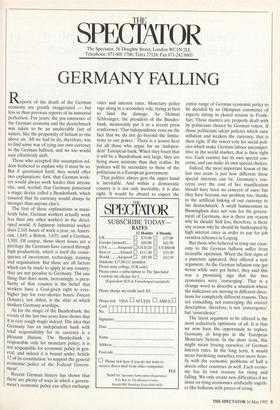SPECfAT THE OR
The Spectator, 56 Doughty Street, London WC1N 2LL Telephone: 071-405 1706; Telex 27124; Fax 071-242 0603
GERMANY FALLING
Reports of the death of the German economy are greatly exaggerated — but less so than previous reports of its immortal perfection. For years, the pre-eminence of the German economy and the deutschmark was taken to be an unalterable fact of nature, like the propensity of helium to rise above air. All we had to do, therefore, was to find some way of tying our own currency to the German balloon, and we too would soar effortlessly aloft.
Those who accepted this assumption sel- dom bothered to explain why it must be so. But if questioned hard, they would offer two explanations: first, that German work- ers would always work harder than anyone else, and, second, that Germany possessed a magic device called a Bundesbank, which ensured that its currency would always be stronger than anyone else's.
The first of these explanations is mani- festly false. German workers actually work less than any other workers in the devel- oped world. A Japanese industrial worker does 2,165 hours of work a year; an Ameri- can, 1,845; a Briton, 1,635; and a German, 1,505. Of course, those short hours are a privilege the Germans have earned through high productivity, which is itself the conse- quence of investment, technology, training and organisation. But those are all factors which can be made to apply in any country: they are not peculiar to Germany. The one thing that does seem, increasingly, a pecu- liarity of that country is the belief that workers have a God-given right to ever- higher pay for ever-shorter hours. Freizeit (leisure), not Arbeit, is the altar at which modern Germany worships.
As for the magic of the Bundesbank, the events of the last two years have shown that it is very rough magic indeed. The idea that Germany has an independent bank with total responsibility for its currency is a Pleasant illusion. The Bundesbank is responsible only for monetary policy; it is not responsible for economic policy in gen- eral, and indeed it is bound under Article 12 of its constitution `to support the general economic policy of the Federal Govern- ment'.
Recent German history has shown that there are plenty of ways in which a govern- ment's economic policy can affect exchange
rates and interest rates. Monetary policy tags along in a secondary role, trying at best to limit the damage. As Helmut Schlesinger, the president of the Bundes- bank, memorably put it in a recent press conference: 'Our independence rests on the fact that we do not go beyond the limita- tions to our power.' There is a lesson here for all those who argue for an Indepen- dent' European bank. When they boast that it will be a Bundesbank writ large, they are being more accurate than they realise. Its policies will be secondary to those of the politicians in a European government.
That politics always gets the upper hand is inevitable. And within a democratic country it is not only inevitable, it is also right. It would be absurd to expect the entire range of German economic policy to be decided by an Olympian committee of experts sitting in closed session in Frank- furt. These matters are properly dealt with by politicians chosen by German voters. If those politicians adopt policies which raise inflation and weaken the currency, that is their right. If the voters vote for social poli- cies which make German labour uncompet- itive in the world market, that is their right too. Each country has its own special con- cerns, and can make its own special choices.
Indeed, the most important lesson of the last two years is just how different those special interests can be. Germany's con- cerns over the cost of her reunification should have been no concern of ours; but they have become our problem too, thanks to the artificial linking of our currency to the deutschmark. A small businessman in Birmingham does not vote for the govern- ment of Germany, nor is there any reason why he should. Still less, therefore, is there any reason why he should be bankrupted by high interest rates in order to pay for job creation schemes in Leipzig.
But those who believed in tying our econ- omy to the German balloon suffer from incurable optimism. When the first signs of a puncture appeared, they offered a new argument. As the German inflation rate got worse while ours got better, they said this was a promising sign that the two economies were `converging'. That is a strange word to describe a situation where the indicators are moving in different direc- tions for completely different reasons. They are coinciding, not converging; the correct description, therefore, is not `convergence' but 'coincidence'.
The latest argument to be offered is the most seductively optimistic of all. It is that we now have the opportunity to replace Germany as king-pin in the European Monetary System. In the short term, this might mean freeing ourselves of German interest rates. In the long term, it would mean burdening ourselves even more heav- ily with the economic problems of half a dozen other countries as well. Each econo- my has its own reasons for rising and falling. We only create new difficulties if we insist on tying economies artificially togeth- er like balloons with pieces of string.


















































 Previous page
Previous page